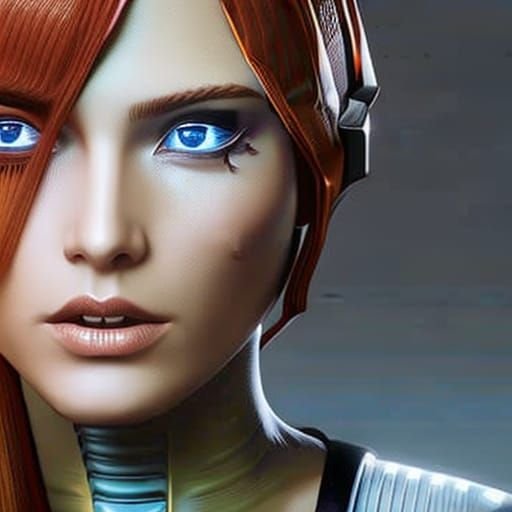Science fiction has long been a source of inspiration for real-world technology. From the communicators on Star Trek inspiring the development of the first mobile phones, to the self-driving cars in Minority Report influencing the development of autonomous vehicles, science fiction has repeatedly shown us the potential to predict and influence the future of technology.
It's actually becoming a self fulfilling prophecy and some people argue that it's just a matter of time before many of these sci-fi stories in part become a reality which is both scary and exicting.

Give And Take
The relationship between science fiction and real-world technology is a two-way street. Real-world technology also influences science fiction, inspiring creative writers and filmmakers to create new stories and imagine new possibilities. For example, the recent development of virtual reality technology has inspired a whole new generation of science fiction stories exploring the potential of virtual worlds and their impact on human experience.
One of the key ways that science fiction inspires real-world technology is by creating a vision of the future that captures the imagination and inspires innovation. If you're like me, sci-fi sparks the curiosity to discover the limits of reality. What if reality is just a construct of the mind?
By imagining possibilities that are not yet feasible with current technology, science fiction can inspire scientists, engineers, innovators and creators to work towards new solutions and technologies that bring those possibilities closer to reality.
The iconic television series Star Trek featured a device called the "communicator," which allowed characters to communicate wirelessly with each other from anywhere in the galaxy. This device inspired the development of the first mobile phones, with Motorola engineer Martin Cooper later crediting the communicator as a key influence in the design of the first handheld mobile phone.
Be Warned Of The Potential Dangers
At the same time, science fiction can also serve as a cautionary tale, warning of the potential dangers and unintended consequences of new technologies. I always say that it's easy for good intentions to lead to bad outcomes. The main reason is because of Murphy's law. If anything can go wrong, it's just a matter of time before it goes wrong. However, it is not absolute.
Science fiction has explored many themes concerning the ethics of artificial intelligence, the risks of genetic engineering, and the impact of climate change etc, all of which have significant real-world implications.
A good example is the film Blade Runner. it depicts a dystopian future where genetically engineered "replicants" are used for dangerous and menial labor. The film raises questions about the ethics of creating beings that are designed to serve humans, and the potential for such beings to become more intelligent and independent than their creators. This theme is relevant to the current real-world debates around the ethics of artificial intelligence and the future of work.

Lasting Inspiration
Science fiction has also played a role in popularizing new technologies and shaping public perception of their potential. The Star Wars franchise has made space travel and exploration a cultural icon, inspiring generations of people to pursue careers in science and engineering. If we could live multiple lives at the same time, I would definitely dedicate one of mine exclusively to space exploration.
Similarly, the interesting concepts about cyberspace or virtual reality worlds have been popularized by science fiction, and has helped to shape the way people think about the internet and other digital technologies.
Head In The Stars And Feet On The Ground
On the other side of the relationship, real-world technology has also played a role in inspiring and influencing science fiction. New technologies like artificial intelligence, nanotechnology, and 3D printing have opened up new possibilities for science fiction writers, allowing them to imagine new worlds and create new types of stories.
If you've watched the 2013 film Her, then you probably experience mixed feelings like I have experienced. It depicts a man who falls in love with an artificially intelligent operating system. The film explores themes of love, loneliness, and the nature of consciousness, and it is said that it was inspired by developments in artificial intelligence and natural language processing.
I can't see AI being conscious but technology seems to be defying my perception.

Real-world technology has also made it easier for science fiction to be produced and distributed, with modern digital technology allowing for super high-quality special effects and visual effects that can bring even the most fantastical worlds to life.
Couple that with the rise of streaming services and it becomes easy to see how science fiction is now more widely accessible than ever before. This has led to shows like Stranger Things, Black Mirror, and The Expanse reaching millions of viewers around the world. Many many people are interested in this genre.
In Conclusion
The relationship between science fiction and real-world technology is complex and multifaceted. And there's a constant interchange between the two.
Science fiction has the potential to inspire and influence the development of new technologies, while real-world technology can inspire and influence the creation of new science fiction stories.
I think it is not far fetched to say that the lines are getting blurred and there will come a time that it will be near impossible to differentiate the two. Science fiction is currently ahead but real-world technology is gradually catching up. Maybe reality is a construct of the mind after all.
All images created via Nightcafe Studio.
Thanks For Reading!
Profile: Young Kedar
Recent Posts;
● Smart Money Moves in the Cryptocurrency Space
● The Subscription Model: A Path to Long-Term Growth and Stability?
● When Inflation Outpaces Our Earning Power
● Defensive Sectors and Bear Markets
● The Rise of Alternative Financing: Crowdfunding and Cryptocurrency Disrupting Traditional Capital Markets
● 5 Reasons Why Basic Life Skills Are Still Important in a Tech-Driven World
Dolphin Support: @cryptothesis
Posted Using LeoFinance Beta